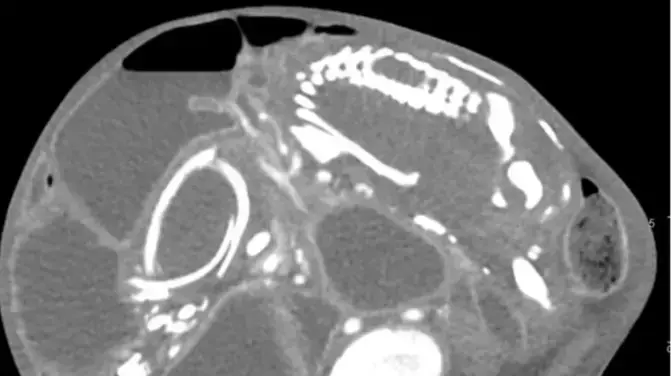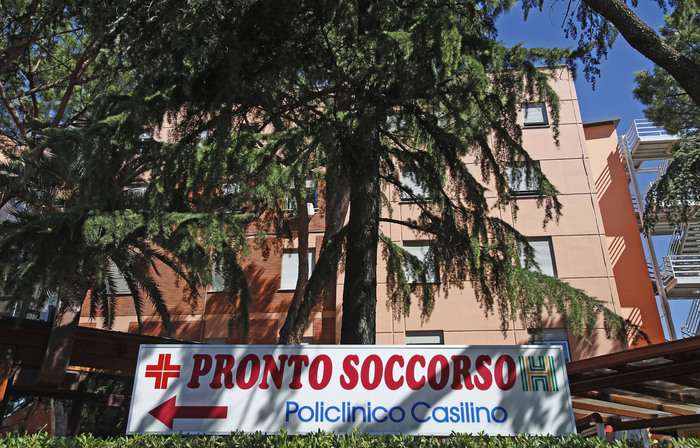Prof. Liran Hirsch explains what a high-risk pregnancy is and in which cases it is necessary to preserve the pregnancy (Walla system!)
A woman died of severe malnutrition after carrying an unborn fetus in her body for about nine years, a medical report in the journal BMC Women's Health revealed this week. The woman, originally from the Congo, visited doctors in New York complaining of stomach cramps and indigestion after eating. Scans revealed that the girl was a
girl The 50th was a "stone baby" - a calcified fetus - that compressed her intestines, which was attributed to a miscarriage nine years earlier. This phenomenon has a name - lithopedion (a descriptive term derived from the Greek lithos, meaning stone, and payion, child). And it is created when the pregnancy takes place in the abdomen and not in the uterus. When the pregnancy eventually fails, usually because the fetus does not have enough blood supply, there is no way for the body to "get rid" of the fetus. As a result, the body puts the fetus through a calcification process and turns it into a 'stone' through the same process The immune system that protects against any foreign object found in the human body.The main problem is that it becomes a threat to the mother's health.
The patient refused treatment, saying she believed her health condition was related to a 'spell' cast on her by someone in Africa.
The fetus - which was the woman's ninth child - stopped developing inside her at 28 weeks.
"Stone Baby".
Ultrasound of the mother's abdomen (photo: official website, bmcwomenshealth)
The woman died 14 months after arriving in the United States.
The doctors said that she died of severe malnutrition.
In these cases, death may eventually be caused by tissue breakdown leading to cardiac arrest or cardiac arrhythmia, an irregular heartbeat.
Other causes include infection, caused by a weakened immune system.
For this woman, the 'stone baby' continued to compress her gut, causing blockages, meaning her body was no longer able to absorb vital nutrients.
Dr. Wasim Soos, an internal medicine specialist at SUNY Upstate Medical University who reported on the case, said the patient "refused intervention due to fear of surgery.
"Unfortunately, she died of severe malnutrition in the context of recurrent bowel obstruction due to lithopedion and a constant fear of seeking medical attention."
Lithopedion has only been documented 290 times, the first being in France in 1582. Some mothers report severe symptoms as a result, but others can live for decades years without suffering the signs of the condition.
More in Walla!
How do you turn a plastic package into a flower pot?
In cooperation with the Tamir Recycling Corporation
Blocked her intestines and caused malnutrition.
The fossilized fetus in the mother's womb (photo: official website, bmcwomenshealth)
The woman lived in Tanzania and had eight children, born naturally.
Three died shortly after birth.
During her ninth pregnancy, she visited a clinic in a refugee camp after noticing that her baby was no longer moving.
The doctors there told her that the baby had no pulse and advised her to try to miscarry naturally at home, and if that didn't work, to come back in two weeks.
She followed the instructions, but when she returned to the clinic she was greeted by outsiders who accused her of 'bad work' and 'killing the baby'.
This led to the mother rushing home and praying, before deciding not to seek medical help.
She then carried the dead fetus for nine years and did not see a doctor until her last check-up.
When the mother arrived in the U.S., she was taken for CT scans that revealed an obstruction in her small intestine and compression of major veins. The findings also showed a mass inside her abdomen measuring about six by eight centimeters that contained a skeleton. Doctors offered her surgery to remove the mass, but she refused - saying the condition was due to a curse Someone imposed on her in Tanzania. She added and told the doctors: "I'll let you know when I'm ready.
I'm not afraid of death.'
The doctors did eventually convince her to take antibiotics to help with her stomach complaints and pills to lower her blood pressure.
But she continued to refuse surgery.
As mentioned, about 14 months after her arrival in the US, she died of malnutrition.
Decades in the stomach
According to a 1996 article in the Journal of the Royal Society of Medicine, only 290 cases of lithodium have ever been documented in the medical literature.
The earliest is of a 68-year-old French woman, Madame Colombe Chetri.
After an autopsy after her death in 1582, she was found to be carrying a fully developed stone baby in her abdominal cavity.
Chhetri, whose stomach was "swollen, hard and painful throughout her life", carried her stone child for 28 years.
In 2021, we reported here in the section about a 73-year-old woman from Algeria who discovered completely by chance that she was carrying a fossilized fetus in her body.
This rare condition had been going on in her stomach for decades without her even noticing.
The woman, whose name has not been published, carried the fetus that weighed just over two kilograms and was seven months old, for 35 years, during which time she enjoyed a good quality of life and her health was not harmed by the presence of the fetus inside her body.
Amazingly, she had previously undergone medical treatment but the doctors did not discover the fossilized fetus.
health
news
Tags
Passes
pregnancy















